The Writing Life of: Gareth Southwell
Gareth Southwell
This week I am thrilled to be interviewing author Gareth Southwell. Gareth will be sharing with us details of his writing life, telling us all about his new book ‘Pale Kings‘, which was released on 15th May 2021 and answering a few fun questions. This post contains affiliate links.

Gareth Southwell is a writer and illustrator from South Wales, UK. He writes both fiction (sci-fi) and non-fiction (philosophy), is a professional illustrator and book cover designer, and has a PhD in death, which has been read by exactly four people (including himself).
His first novel MUNKi is just a thinly fictionalised version of this, with most of the boring bits taken out and replaced with robots and people swearing in Welsh.
1) Did you enjoy writing when you were a child?
Actually, not a lot. When I was young, my handwriting was messy and I was made to do extra lessons to improve it while the rest of my class moved on to other things. I remember being upset by this, and for years I found the physical act of handwriting to be laborious.
Word processors changed all that and the most useful training I’ve ever undertaken was a touch-typing course. I’m not super-fast, but I can now write quickly and fluently, which has allowed my love of writing to grow.
2) Which author shaped your childhood?
Without a doubt, it was René Goscinny and Albert Uderzo, who wrote and illustrated the Asterix comic books. I was obsessed with these books, and for years I preferred comics over novels (I think I read my first novels when I was about 13 – the first Adrian Mole book, followed by The Hobbit – and my novel reading gradually increased from that point on).
3) What motivated you to begin your first novel?
I fell in love with English literature at age 16, when I was doing my A levels – I had some really inspirational teachers. From that point on I think I began to secretly harbour the ambition to write something. But then my head got turned by studying philosophy, which then became teaching and writing about it, and I’ve been writing philosophy books for the last 18 years or so.
I got the idea for my first novel (MUNKi) about ten years ago, but it was going to be a comic book/graphic novel, to begin with. I’ve always loved sci-fi since first seeing Star Wars (an obsession to rival that with Asterix), and my study of philosophy made me realise that there was a lot of common ground between the two. I’d also started to get a bit fed up of the types of philosophy books I was being commissioned to write, so I started exploring philosophical ideas via fiction.
The first draft of MUNKi was actually my attempt to pin down the “world” for the graphic novel, but it eventually took on a life of its own – especially when I realised how much extra work a graphic novel would be! Somewhere along the way, I took part in Nanowrimo, and though I didn’t hit the 50k mark, it really helped me to complete a lot of the first draft (though it was many, many redrafts before the book became what it is now).
4) Do you plot your book, or are you a pantser?
A pantser, definitely. I enjoy seeing where a story and its characters will take me, and I find that my writing dries up if I try to restrict myself too much by an idea of what I want to happen. That said, I do generally have a vague overall idea of where I want the story to end up, and perhaps some key events along the way.
At some point, I’ll have a crisis where I realise that I have all sorts of loose ends and plot holes, and from that point the creative pantsing gives way to a sort of anxiety-driven problem solving, which generally involves lists, graphs, timelines and spreadsheets.
5) What is your average writing day?
I don’t really have one. Like many writers, I have to fit my writing around other work. However, as I’ve gotten older, I’ve found that I wake up early in the morning – often around 6am – which gives me an hour or two before the rest of the house rises, and it’s when my energies are freshest. So, after feeding the animals, I do some yoga, have breakfast, check my emails, then may try to squeeze in an hour or so of writing – 500 words would be a good day.
When the book gets more advanced, I find my writing starts to take over other parts of my day, as my mind becomes more obsessed with how everything in the story fits together.
6) What is the best thing about being an author?
I take great pleasure in being alone with my own thoughts, with the freedom to explore and create things, trying to craft something that I can take some artistic pride in. I also take pleasure in the act of creating characters and stories – it’s surprising how attached you can become to fictional people!
Pages – 66
Release Date – 15th May 2021
ISBN 13 – 979-8749196658
Format – ebook, paperback
Synopsis
A Merrywhile Novella
Dean’s got a bit of a problem.
Just three days into his stint minding the family shop and already there’s a jagged hole in the wall where the new smart-drugs vending machine used to be, courtesy of the local psychopathic heavy. But as the clock ticks down on his father’s return, hope appears in the guise of an enigmatic beauty, a girl stepped straight out of Dean’s dreams, proposing a wild and improbable plan that could just change all their lives – maybe even for the better.
Set in the same near-future as the author’s sci-fi novel MUNKi, Pale Kings is a sharp-witted and comical journey into the crazy world of contemporary fine art, the illicit potential of virtual reality gaming, and the neurotic susceptibilities of robotic guard dogs.
Purchase Online From:
7) How did you go about researching the content for your book?
The setting for Pale Kings is an area of Port Talbot where I grew up, so there wasn’t much research required there, apart from occasionally checking my own memories against reality! There is some background reading that I did, concerning the world of fine art (which features in the story), which consisted of a few books, some TV documentaries, and a bit of Googling.
8) How long did it take to go from the ideas stage to writing the last word?
The germ of the idea was a scene that I’d cut from MUNKi. There wasn’t enough space to make it work within that novel, but there was something about the idea that I found I didn’t want to let go of. This made it ideal material for a stand-alone short story, with (mostly) new characters, but set in the same “universe”. But as I started writing, I realised that there was more to it than I thought, and it’s now technically a novella. I guess all this took about 6 months or so, during which I worked on it intermittently.
9) What made you choose the genre you write in?
As I’ve said, I’ve loved sci-fi since childhood. When I discovered philosophy, I realised just how much of sci-fi explores philosophical themes. When I came to write fiction, it was therefore a natural fit.
10) How did you come up with the name(s) for your lead character(s)?
Like other authors, I should imagine, I convince myself that character names are highly significant. And so, I agonise over them, and often change them _ sometimes at the last moment.
There is usually some association – a reference to other fictional characters, or even in the meaning of the name itself (behindthename.com is a great resource!). However, in reality, I suspect few readers spot or appreciate these efforts, and so a character’s name will often end up being a sort of “Easter egg” to be discovered by the diligent, or just a private marker that reminds me what a character means to me.
11) Can you give us an insight into your characters?
I try to find some sympathy in all of the characters I write, whether or not they are “villains”. I think this makes them more believable. Also, I think as writers we draw on aspects of ourselves and experiences for our characters, so in a way they’re all part of me – or me as I could have been, if life had been different.
12) How did you feel when you had completed your book?
Even though Pale Kings is just a novella, I think finishing and publishing it made me feel more of a ‘novelist’: I had written two novel(la)s! I think many writers have imposter syndrome, and question whether they are “really” writers – especially if they’re self-published. But if it walks like a duck, and quacks like a duck, then it’s a duck! (Or possibly a fiendishly constructed cybertronic duck robot – but anyway…). So having two books (and now a third on the way) makes me feel like it’s not all self delusion.
Fun Questions

1) Do you have a favourite quote you live by?
Many quotes, probably, if I really thought hard about it, but the one that seems to have stuck with me the longest is from the philosopher Nietzsche: “There are those who prefer a handful of ‘certainty’ to a whole cartload of beautiful possibilities”.
Philosophy has taught me that certainty is hard to come by, and often we must act and think without absolute assurance about the things we care about. But this also gives us a certain freedom to choose what we want to believe (within limits). So, I’d rather believe that humans are basically decent and that life has meaning, even though there may be no “proof” of either of those things!
2) Do you have any pets?
Yes, we have two cats and a dog. My partner is animal-mad (especially about dogs), and I think we’ll probably always have some sort of pet from now on. The beagle is very sweet natured, but very, very naughty.
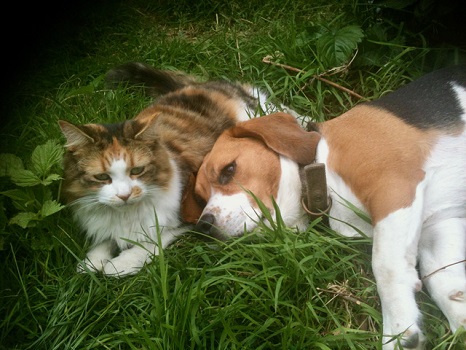
3) What’s on your current reading list?
I’m just finishing Philip K. Dick’s Time Out of Joint, which is – frankly – an odd book, and not one of his best. Also just coming to the end of listening to the audiobook of Claire North’s The First Fifteen Lives of Harry August, which I’m enjoying, and I’ve just started Meghan O’Gieblyn’s God, Human, Animal, Machine, which is all about the crossover between science, technology and religion.
Audiobooks are great, I think, and mean that I can listen when I’m doing other things (drawing, housework). Next up is either Dickens Hard Times, or one of Iain M. Banks’ culture novels, which I’m gradually working my way through.
4) Your book has been made into a feature film, you’ve been offered a cameo role, what would you be doing?
I’d be running a small newspaper stand in Venice, and telling someone off for treating it like a library!
5) If you could travel to the fictional world of any book for the day, which would you choose?
Something futuristic – Blade Runner, perhaps, or one of Iain Banks’ novels – or else (and this is a cheat) something which allowed me to visit Shakespeare’s Globe Theatre and see what Elizabethan England was really like.
6) There’s a penguin sitting in your writing chair, what is the first thing he says to you?
“You know, you really need better lower back support.”
I would like to say a big thank you to Gareth Southwell for sharing with us details of his writing life and for a wonderful interview.


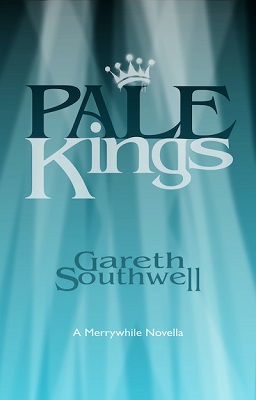





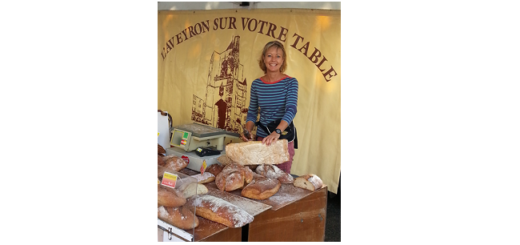
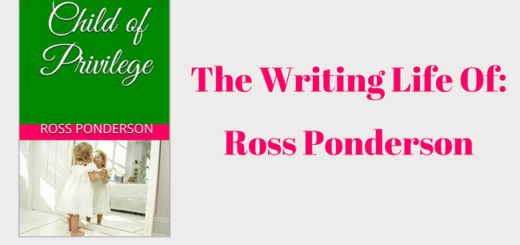
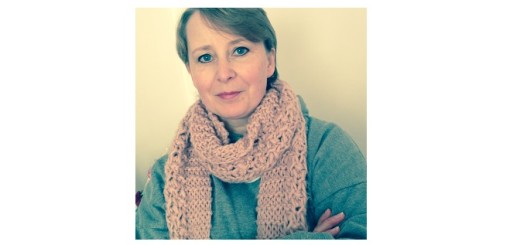

He sounds like quite a character and I’d bet he would be fun to sit with at parties.
As a Canadian, I don’t often see the term pantser, as a writer I admire writers who can work that way.
Great interview..
Thanks you DJ. I agree he does sound like quite the character.
Thank you Anthony for your comment. Judging by my interviews a lot of authors work this way. I am in awe of them to be able to.
Thank you Nadene. Glad you liked it.